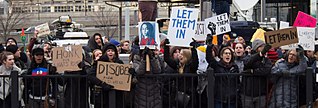
Border control comprises measures taken by governments to monitor and regulate the movement of people, animals, and goods across land, air, and maritime borders. While border control is typically associated with international borders, it also encompasses controls imposed on internal borders within a single state.

The Canada–United States Safe Third Country Agreement (STCA) is a treaty, entered into force on 29 December 2004, between the governments of Canada and the United States to better manage the flow of refugee claimants at the shared land border.
The visa policy of Malaysia consists of the requirements for foreign nationals to travel to, enter, and remain in Malaysia. Most visitors to Malaysia are granted visa-free entry for a period of 90, 30, or 14 days respectively.

Derrick Kahala Watson is an American lawyer who serves as the Chief United States district judge of the United States District Court for the District of Hawaii.

The first 100 days of Donald Trump's presidency began on January 20, 2017, the day Donald Trump was inaugurated as the 45th president of the United States. The first 100 days of a presidential term took on symbolic significance during Franklin D. Roosevelt's first term in office, and the period is considered a benchmark to measure the early success of a president. The 100th day of his presidency ended at noon on April 30, 2017.

Immigration policy, including illegal immigration to the United States, was a signature issue of former U.S. president Donald Trump's presidential campaign, and his proposed reforms and remarks about this issue generated much publicity. Trump has repeatedly said that illegal immigrants are criminals.

Executive Order 13769, titled Protecting the Nation from Foreign Terrorist Entry into the United States, labeled the "Muslim ban" by Donald Trump and his supporters and critics, and commonly known as such, or commonly referred to as the Trump travel ban, or Trump Muslim travel ban, was an executive order by President Trump. Except for the extent to which it was blocked by various courts, it was in effect from January 27, 2017, until March 6, 2017, when it was superseded by Executive Order 13780, a second order sharing the title "Protecting the Nation from Foreign Terrorist Entry into the United States".

In late January and early February 2017, during protests against Executive Order 13769, thousands of people gathered at various airports in the United States and around the world to prevent the returning of refugees and other visitors from seven countries considered to be unsafe. According to various sources, more than two thousand people were at the protest at John F. Kennedy International Airport in Queens, New York City with other protests appearing at significant international airports and other important sites around the United States. Protests continued daily and internationally through February 6. Protests also continued after a federal judge issued a temporary restraining order against parts of the travel ban.
A Muslim immigration ban is a ban, either absolute or from specific nations, on the immigration of Muslims to a specific nation.

Executive Order 13769 was signed by U.S. President Donald Trump on January 27, 2017, and quickly became the subject of legal challenges in the federal courts of the United States. The order sought to restrict travel from seven Muslim majority countries: Iran, Iraq, Libya, Somalia, Sudan, Syria, and Yemen. The plaintiffs challenging the order argued that it contravened the United States Constitution, federal statutes, or both. On March 16, 2017, Executive Order 13769 was superseded by Executive Order 13780, which took legal objections into account and removed Iraq from affected countries. Then on September 24, 2017, Executive Order 13780 was superseded by Presidential Proclamation 9645 which is aimed at more permanently establishing travel restrictions on those countries except Sudan, while adding North Korea and Venezuela which had not previously been included.
Many organizations reacted to the enactment of Executive Order 13769, titled "Protecting the Nation from Foreign Terrorist Entry into the United States," which was an executive order issued by United States President Donald Trump. Domestically, the order was criticized by Democratic and Republican members of Congress, universities, business leaders, major corporations, Catholic bishops, and Jewish organizations. Some 1,000 U.S. diplomats signed a dissent cable opposing the order, setting a record. Public opinion was divided, with initial national polls yielding inconsistent results. Protests against the order erupted in airports and cities.

State of Washington and State of Minnesota v. Trump, 847 F.3d 1151, was a lawsuit that challenged the constitutionality of Executive Order 13769, issued by U.S. president Donald Trump.

Executive Order 13780, titled Protecting the Nation from Foreign Terrorist Entry into the United States, was an executive order signed by United States President Donald Trump on March 6, 2017. It placed a 90-day restriction on entry to the U.S. by nationals of Iran, Libya, Somalia, Sudan, Syria and Yemen, and barred entry for all refugees who did not possess either a visa or valid travel documents for 120 days. This executive order—sometimes called "Travel Ban 2.0"—revoked and replaced Executive Order 13769 issued on January 27, 2017.

International Refugee Assistance Project v. Trump, 883 F. 3d 233, was a decision of the United States Court of Appeals for the Fourth Circuit, sitting en banc, upholding an injunction against enforcement of Proclamation No. 9645, titled "Enhancing Vetting Capabilities and Processes for Detecting Attempted Entry Into the United States by Terrorists or Other Public-Safety Threats", a presidential proclamation signed by President Donald Trump on September 24, 2017. The proclamation indefinitely suspends the entry into the U.S. of some or all immigrant and non-immigrant travelers from eight countries. It is a successor to Executive Order 13769, entitled "Protection of the Nation from Terrorist Entry into the United States," which were also enjoined by the District Court of Maryland and the Fourth Circuit in a case decided in 2017 by the same name of International Refugee Assistance Project v. Trump, 857 F.3d 554.
Trump v. Hawaii, No. 17-965, 585 U.S. ___ (2018), was a landmark United States Supreme Court case involving Presidential Proclamation 9645 signed by President Donald Trump, which restricted travel into the United States by people from several nations, or by refugees without valid travel documents. Hawaii and several other states and groups challenged the Proclamation and two predecessor executive orders also issued by Trump on statutory and constitutional grounds. Citing a variety of statements by Trump and administration officials, they argued that the proclamation and its predecessor orders were motivated by anti-Muslim animus.

During the COVID-19 pandemic, many countries and regions imposed quarantines, entry bans, or other travel restrictions for citizens of or recent travelers to the most affected areas. Some countries and regions imposed global restrictions that apply to all foreign countries and territories, or prevent their own citizens from travelling overseas.

The U.S. Citizenship Act of 2021 was a legislative bill that was proposed by President Joe Biden on his first day in office. It was formally introduced in the House by Representative Linda Sánchez. It died with the ending of the 117th Congress.

Ending Discriminatory Bans on Entry to The United States was the second presidential proclamation signed by President Joe Biden on January 20, 2021. The proclamation revoked Executive Order 13769 and Executive Order 13780, titled Protecting the Nation from Foreign Terrorist Entry into the United States, which had been signed by U.S. President Donald Trump on January 27, 2017 and March 6, 2017 respectively, and Proclamations 9645, 9723, and 9983.















